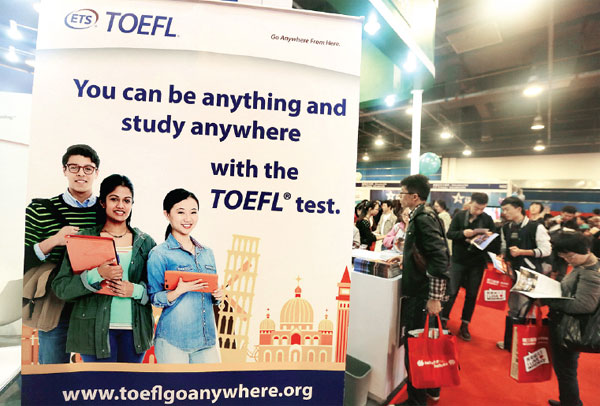International schools booming in China
By He Wei in Shanghai| chinadaily.com.cn| Updated: Dec 16, 2019

A poster for TOEFL test is displayed at the China Education Expo in Beijing. [Photo provided to China Daily]
International education is booming in China, with more demands from expats who work and live on an upward trajectory, according to a seasoned educator.
"I see China at the start of international education, opening itself up to the demands of it (the market), where there are more and more expats coming into China now," said Kathryn Richardson, principal of Wellington College International Hangzhou.
The enthusiasm is driven by a desire to let children grow not just academically competitive in a global curriculum, but also in their holistic development to include a number of soft skills, such as creativity and communications, she noted.
The advanced infrastructure and robust business environment in China have become prerequisites for international schools to gain a strong foothold, according to Richardson, and more importantly, allows for students to enter the best universities worldwide.
Opening its doors last year, the Hangzhou School is enrolling pupils from Year 1 to 10, which translates to students 5 to 15 years old. In the prep phases, or Year 3 to Year 9, the curriculum is based on the National Curriculum for England, supported by the International Primary Curriculum.
"We have a complete mix of families. What I can say is that our families are very much focused on the high-tech resources we have in school and that the curriculum is equipping the children for the skills that they will need," she said.
In an earlier interview with Xinhua News Agency, Paul Rogers, founding executive master of Wellington College Hangzhou, attributed the city's reputation as a hub for innovation and creativity that has attracted high-end foreign talent in fields such as technology and e-commerce.
"Many have moved to the city with families, and this has triggered high demand for international education institutions," Rogers said.
To immerse students in Chinese traditions, the school teaches Mandarin and participates in celebrations of local culture, according to Richardson. "We feed it all into our curriculum so the children are getting that richness and good understanding of where they're living, as well as the international focus."
"Working in a foreign country was the result of both personal and career choices, the quest for a wider experience and getting out of a certain comfort zone," said Mathieu Clairembault, a parent of two children who are enrolled in the school.
"Our children's education has to meet international standards. We want them to develop skills and character…and to be able to move to another country (homeland or other) with ease," he said.
According to the UK Department for International Trade, there will be more than 20 British school brands with over 50 campuses in China by the end of 2020.



 play
play